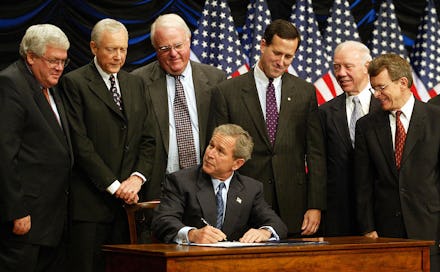George W. Bush might have been a supportive parent, but that doesn't make him a feminist

Will history remember George W. Bush as a great feminist? Most likely, no. Nonetheless, that's exactly how his daughter Jenna Bush Hager chose to describe her father in a recent interview with People.
"People laugh at this, but I think my dad was a feminist," she said. "He showed us that we could be whatever we wanted to be. I want my girls to feel that way. I want them to feel strong and capable and feel like they can conquer the world."
Bush Hager added that she and her sister, Barbara Pierce Bush, "always felt sorry for the boys in [their] class, because our dad led us to believe that we were the smartest, most capable kids out there."
Bush might be supportive of his daughters, but he's not exactly a feminist. Feminism is the belief that people should be equal regardless of sex or gender — so, if Bush were actually a feminist, then his political track record would reflect the endorsement of policies that help advance women to the same status as men. It does not.
Though one favored Bush slogan was "W Stands for Women," the reality of his presidency tells a different story. On his first day as president, in 2001, Bush signed off on the "global gag rule," the Ronald Reagan-era policy beloved of conservatives that blocks international family planning services from receiving U.S. funds if they offer abortion services (that President Donald Trump recently revived). At the time, the Center for Reproductive Rights estimated that 78,000 women worldwide died from unsafe abortions each year, a number that would only rise if abortion access were cut — especially considering that the rule blocked funding for contraceptives and standard reproductive care.
Other highlights from Bush's reproductive rights record are the 2002 signing of the Born Alive Infants Protection Act, which redundantly awarded personhood at birth, and the 2003 signing of a bill that criminalized "partial birth abortions" — which is to say, late-term abortions, which currently represent about 1% of all procedures performed and generally occur only when the woman's life is in danger or the fetus will be born with grave birth defects.
An imposition of abortion restriction, coupled with restriction of birth control access, does not suggest a friendliness to women's advancement. In fact, books have been written about Bush's "war on women."
To be sure, Bush appointed women to cabinet positions, including Elaine Chao — his labor secretary, now President Donald Trump's transportation secretary — and Condoleezza Rice — his national security adviser. But it's hard to buy those moves were feminist. Indeed, one of Bush's first moves as president was to abolish the office on women's issues his predecessor, Bill Clinton, established.
Bush billed himself as pro-woman because he needed women to win. The presence of his wife, low-key Democrat Laura Bush, was meant to build bridges. But, as Mother Jones reported, Bush's administration acted in opposition to almost every issue she advanced. Its systematic reversal of whatever steps women took toward equality under President Clinton led journalist Richard Goldstein to label Bush's politics "stealth misogyny."
Bush Hager's theory is the same one Ivanka Trump offered during her father's campaign, which was an equally ill fit. "My father is a feminist," Trump said, explaining that her father hired women and had always told her "that I could do anything I set my mind to if I married vision and passion with work ethic."
That angle looked even more outlandish when, months later, surreptitiously recorded audio of her father bragging about grabbing non-consenting women's genitals leaked to the press. Republican men condemned Trump's comments as personal affronts to their wives and their daughters, but went ahead and voted for him anyway.
Being a supportive parent by believing in your daughters and instilling confidence in them is very nice and good, but it's not the same thing as advocating for equal rights, which is the core of feminism.